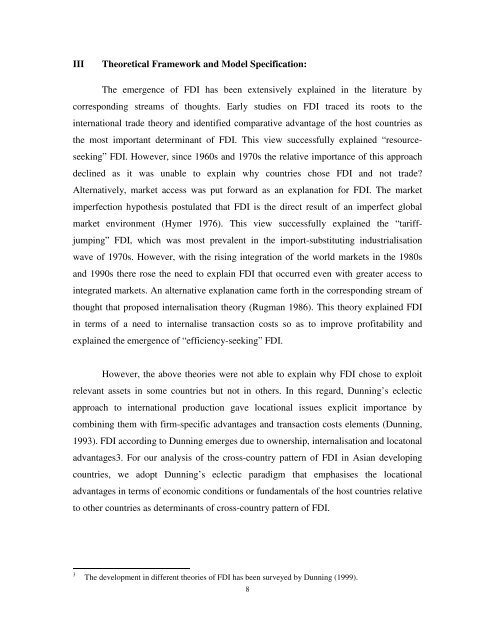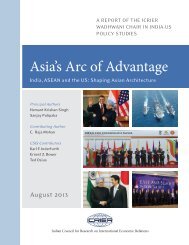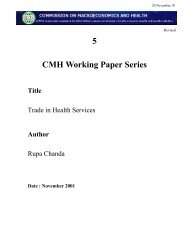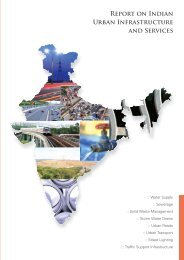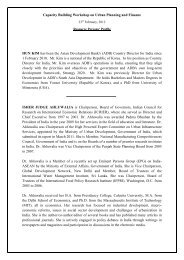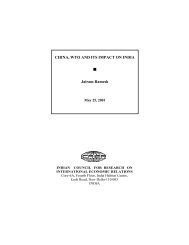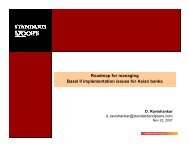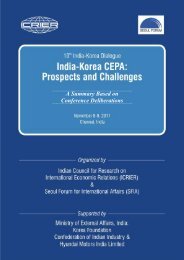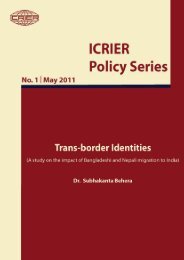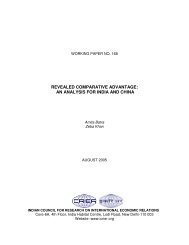impact of government policies and investment agreements on fdi ...
impact of government policies and investment agreements on fdi ...
impact of government policies and investment agreements on fdi ...
You also want an ePaper? Increase the reach of your titles
YUMPU automatically turns print PDFs into web optimized ePapers that Google loves.
III<br />
Theoretical Framework <str<strong>on</strong>g>and</str<strong>on</strong>g> Model Specificati<strong>on</strong>:<br />
The emergence <str<strong>on</strong>g>of</str<strong>on</strong>g> FDI has been extensively explained in the literature by<br />
corresp<strong>on</strong>ding streams <str<strong>on</strong>g>of</str<strong>on</strong>g> thoughts. Early studies <strong>on</strong> FDI traced its roots to the<br />
internati<strong>on</strong>al trade theory <str<strong>on</strong>g>and</str<strong>on</strong>g> identified comparative advantage <str<strong>on</strong>g>of</str<strong>on</strong>g> the host countries as<br />
the most important determinant <str<strong>on</strong>g>of</str<strong>on</strong>g> FDI. This view successfully explained “resourceseeking”<br />
FDI. However, since 1960s <str<strong>on</strong>g>and</str<strong>on</strong>g> 1970s the relative importance <str<strong>on</strong>g>of</str<strong>on</strong>g> this approach<br />
declined as it was unable to explain why countries chose FDI <str<strong>on</strong>g>and</str<strong>on</strong>g> not trade?<br />
Alternatively, market access was put forward as an explanati<strong>on</strong> for FDI. The market<br />
imperfecti<strong>on</strong> hypothesis postulated that FDI is the direct result <str<strong>on</strong>g>of</str<strong>on</strong>g> an imperfect global<br />
market envir<strong>on</strong>ment (Hymer 1976). This view successfully explained the “tariffjumping”<br />
FDI, which was most prevalent in the import-substituting industrialisati<strong>on</strong><br />
wave <str<strong>on</strong>g>of</str<strong>on</strong>g> 1970s. However, with the rising integrati<strong>on</strong> <str<strong>on</strong>g>of</str<strong>on</strong>g> the world markets in the 1980s<br />
<str<strong>on</strong>g>and</str<strong>on</strong>g> 1990s there rose the need to explain FDI that occurred even with greater access to<br />
integrated markets. An alternative explanati<strong>on</strong> came forth in the corresp<strong>on</strong>ding stream <str<strong>on</strong>g>of</str<strong>on</strong>g><br />
thought that proposed internalisati<strong>on</strong> theory (Rugman 1986). This theory explained FDI<br />
in terms <str<strong>on</strong>g>of</str<strong>on</strong>g> a need to internalise transacti<strong>on</strong> costs so as to improve pr<str<strong>on</strong>g>of</str<strong>on</strong>g>itability <str<strong>on</strong>g>and</str<strong>on</strong>g><br />
explained the emergence <str<strong>on</strong>g>of</str<strong>on</strong>g> “efficiency-seeking” FDI.<br />
However, the above theories were not able to explain why FDI chose to exploit<br />
relevant assets in some countries but not in others. In this regard, Dunning’s eclectic<br />
approach to internati<strong>on</strong>al producti<strong>on</strong> gave locati<strong>on</strong>al issues explicit importance by<br />
combining them with firm-specific advantages <str<strong>on</strong>g>and</str<strong>on</strong>g> transacti<strong>on</strong> costs elements (Dunning,<br />
1993). FDI according to Dunning emerges due to ownership, internalisati<strong>on</strong> <str<strong>on</strong>g>and</str<strong>on</strong>g> locat<strong>on</strong>al<br />
advantages3. For our analysis <str<strong>on</strong>g>of</str<strong>on</strong>g> the cross-country pattern <str<strong>on</strong>g>of</str<strong>on</strong>g> FDI in Asian developing<br />
countries, we adopt Dunning’s eclectic paradigm that emphasises the locati<strong>on</strong>al<br />
advantages in terms <str<strong>on</strong>g>of</str<strong>on</strong>g> ec<strong>on</strong>omic c<strong>on</strong>diti<strong>on</strong>s or fundamentals <str<strong>on</strong>g>of</str<strong>on</strong>g> the host countries relative<br />
to other countries as determinants <str<strong>on</strong>g>of</str<strong>on</strong>g> cross-country pattern <str<strong>on</strong>g>of</str<strong>on</strong>g> FDI.<br />
3<br />
The development in different theories <str<strong>on</strong>g>of</str<strong>on</strong>g> FDI has been surveyed by Dunning (1999).<br />
8


